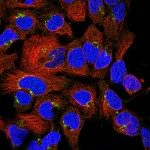Lien vers Pubmed [PMID] – 17085779
J. Mol. Neurosci. 2006;29(3):195-214
Transmissible spongiform encephalopathies (TSEs) in humans and animals are attributed to protein-only infectious agents, called prions. Prions have been proposed to arise from the conformational conversion of the cellular protein PrP(C) into a misfolded form (e.g., PrP(Sc) for scrapie), which precipitates into aggregates and fibrils. It has been proposed that the conversion process is triggered by the interaction of the infectious form (PrP(Sc)) with the cellular form (PrP(C)) or might result from a mutation in the gene for PrP(C). However, until recently, all efforts to reproduce this process in vitro had failed, suggesting that host factors are necessary for prion replication. In this review we discuss recent findings such as the cellular factors that might be involved in the conformational conversion of prion proteins and the potential mechanisms by which they could operate.

